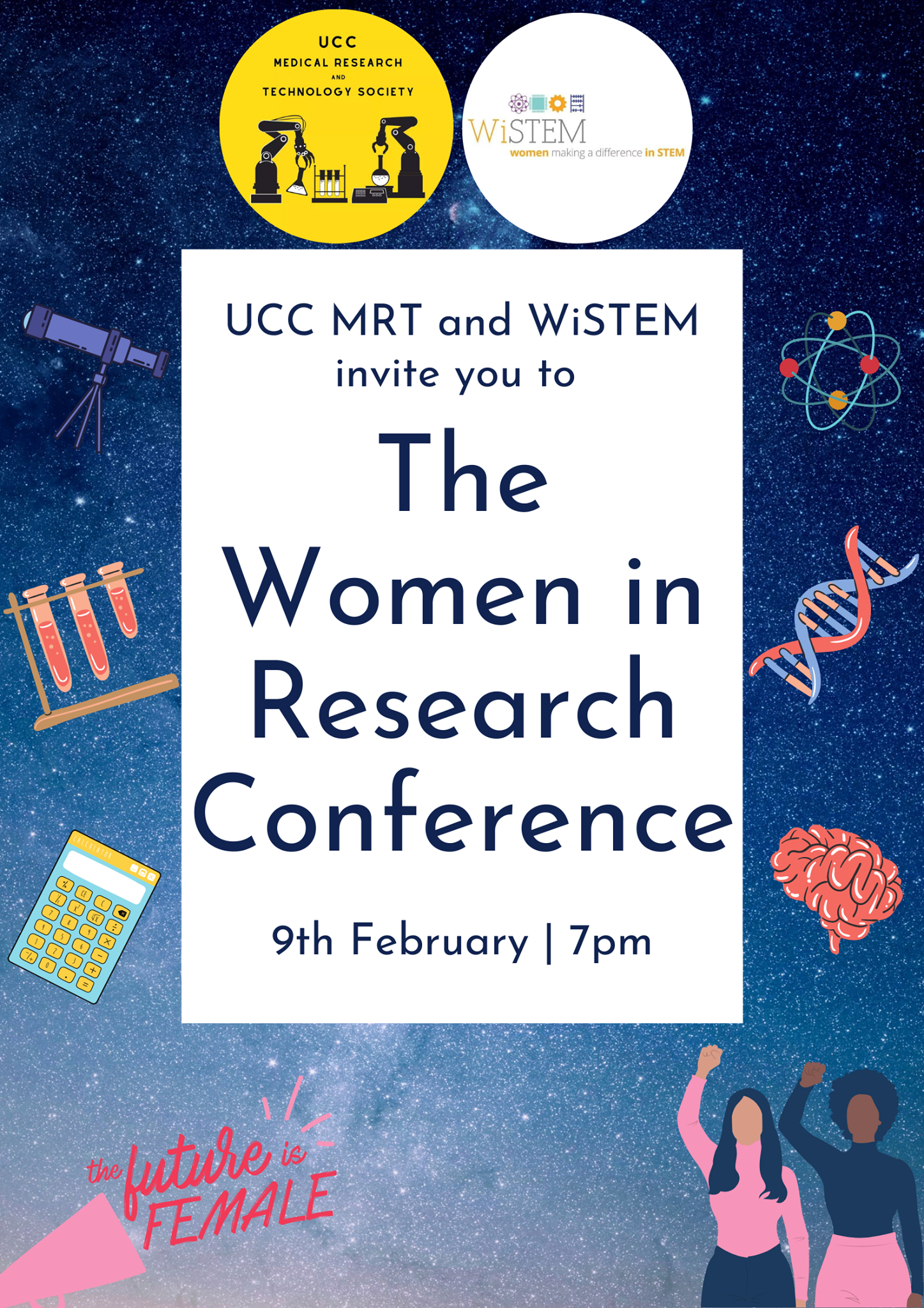This evening I attended my first society event that I had a hand in organising. Last March I joined the Medical Research Technology society as their accessibility officer.
Going into college, I never thought of myself who would become involved in societies. While I do enjoy leading teams, and seeing a project through to the end, my initial opinion of societies was that they wouldn’t be something I would be interested in. Attending the Medtech challenge last year changed my viewpoint dramatically. Given the diversity of societies in UCC I learned that there was a lot of creativity, fun and organisation put into delivering events for the student population. Most committees are motivated by providing useful and fun events and workshops to students.
The purpose of the Women in Research Conference was to highlight the work undertaken by women in research fields such as mathematical sciences, business information systems, AI, cancer research, theoretical physics, public health and biological sciences. I was particularly excited to hear Gaye Kiely’s own research with the Technology-Enabled Organizational Transparency & Openness(TOTO) project here in UCC’s BIS department. We hoped to inspire students from all disciplines in their research endeavours.
Eabhnat Ní Fhloinn spoke about the various journal papers she has published about access, diversity, diagnostic testing in universities in mathematical sciences. Ní Fhloinn also spoke about her background as an associate professor in the School of Mathematical Sciences and the director of DCU Maths Learning Centre. Her PhD is in biometric cryptography from Trinity College Dublin, where she also undertook her BA in mathematics. I will be tracking down a book she recommended, Mindset: The New Psychologist by Dr Carol S Dweck.
Dr Begüm Genç is a post-doctoral researcher in the artificial intelligence field, especially in discrete optimization, constraint satisfaction, decision-making with a focus on planning and scheduling problems, matching problems under preferences, and applying AI solutions to real-world problems. A particularly interesting project she mentioned was UCC’s examination timetable process. UCC was timetabling all exams by hand, aka the staff organised all exam times and locations. As you can imagine, this was challenging work. Genç and her fellow researchers used AI to make this process easier and more cost-effective. Genç is also the Cork community lead for Women in AI non-profit community-driven initiative. Some of the work they have done was collecting data on LinkedIn profiles tagged with qualifications in AI. Only 22% identified as women. As part of Women in AI, Genç also works with educational institutions to create AI certifications & host talks.
I was particularly excited to hear Dr Gaye Kiely present, as she was my lecturer in database theory and practise in both my first and second years of BIS. I had reached out to her to ask for her to speak about her research as I felt you rarely heard about the research done in the business information systems field. Dr Kiely briefly spoke about her early research interests, such as practise drive, software development methodology and project management in virtual teams in the late 90’s/early 2000s. This research certainly was revolutionary, as we are now all working from home during the COVID-19 pandemic. Her more recent research has been driven by her academic role and recent world events. This research has mainly been in inclusion & diversity, open communities and sustainability. Dr Kiely is Co-Principal Investigator for the TOTO (Technology-Enabled Organizational Transparency and Openness) Project. TOTO has a key role in the formation of AIS SIGOPEN and routinely publishes journal & conference papers, hosts/speaks on panels, special issues and conference hacks.
When asked about how female-identifying students can become more involved in research, the speakers unanimously agreed that there are many routes into research. One entry point could be teaching, firstly as a tutor, then transitioning to a lecturer role. Many larger firms, such as Facebook or IBM also invest heavily in research and development. Finding your niche in the research field and becoming confident in your knowledge is also an important component.

